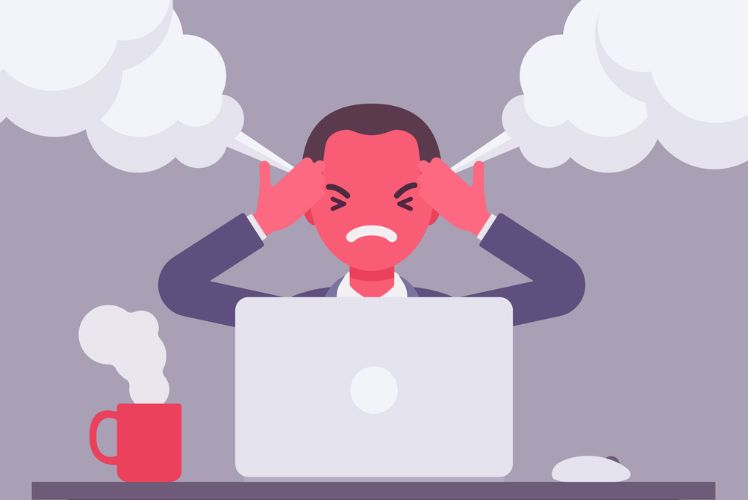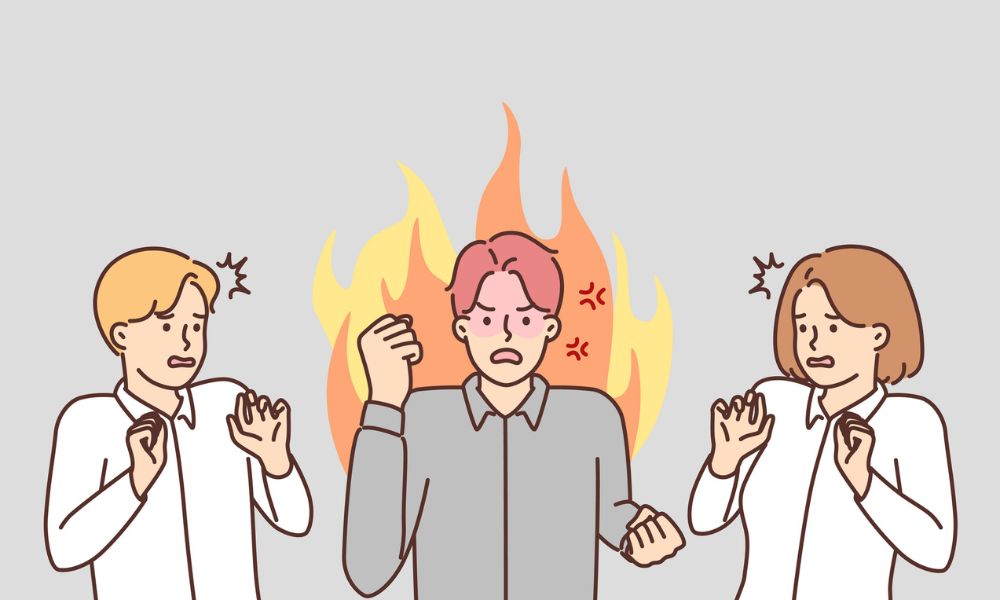Anger can be a powerful emotion that often catches us off guard. Identifying our triggers is crucial to managing anger effectively and responding in healthier ways. When we understand what sparks our anger, we gain the ability to control our reactions and navigate heated situations more calmly.

Recognising personal triggers not only helps in managing our own emotions but also improves our relationships with others. By learning to spot the patterns behind our anger, we can start using techniques to express our feelings constructively rather than letting anger dictate our actions. This awareness is a fundamental step towards achieving a more balanced life.
Key Takeaways
- Identifying triggers is essential for effective anger management.
- Understanding how to express anger can improve our relationships.
- We can develop strategies to prevent anger and build long-term coping skills.
Understanding Anger

Anger is a natural emotion that everyone experiences. It often arises in response to perceived threats or frustrations. To manage anger effectively, we should understand its physiological and emotional aspects. This knowledge helps us recognise our triggers and addresses our responses.
Physiology of Anger
When we feel angry, our body reacts in several ways. We often experience a surge of adrenaline, which prepares us to respond quickly. This is part of the fight or flight response. Our heart rate increases, and blood pressure rises, allowing more blood to flow to our muscles.
Additionally, cortisol, a stress hormone, is released during this state. This combination of chemicals can help us take action but may lead to health issues if it persists. Recognising these anger signs, such as increased heart rate or tense muscles, can help us understand when we are becoming angry. This awareness gives us the opportunity to manage our emotions before they escalate.
Emotional Implications
Anger carries significant emotional implications. It can be a response to feelings of hurt, frustration, or powerlessness. When we feel disrespected or wronged, it may trigger an angry reaction. This emotion can lead to conflict if not addressed properly.
If we allow anger to control us, it can damage our relationships and harm our mental health. We must practise expressing our feelings in healthier ways to avoid these negative outcomes. Understanding our emotional triggers helps us reframe anger and seek constructive solutions rather than allowing it to dictate our actions. By recognising the roots of our anger, we can work towards better emotional control.
Identifying Personal Triggers

Understanding our personal triggers is crucial for managing anger and promoting emotional well-being. By identifying what sets off our emotional responses, we can find better ways to handle stress, navigate difficult conversations, and reduce feelings of depression or passive-aggression.
Recognising Patterns
We often experience similar reactions in various situations. To identify our triggers, we can start by paying close attention to our emotional responses during the day. Keeping a journal can help us spot patterns.
Here are some steps we might follow:
- Log Emotional Responses: Write down when we feel intense emotions. Note the events or people involved.
- Look for Common Themes: Review our entries to detect repeated situations or interactions. Are there consistent factors that lead to stress or anger?
- Evaluate Our Reactions: Consider how we respond during these moments. Do we become defensive, anxious, or passive-aggressive? Recognising these patterns can clarify the triggers we need to address.
External vs Internal Triggers
Triggers can be classified as external or internal. External triggers come from our environment, while internal triggers originate within us.
-
External Triggers: These include interactions with certain people, specific situations, or stressful environments. For instance, having a difficult conversation with a colleague may prompt anger. Recognising these triggers allows us to manage our responses in the moment.
-
Internal Triggers: These often relate to our thoughts or emotions. Feelings of inadequacy or stress may cause anger to arise. Mindfulness techniques can help us notice these internal cues, allowing us to respond instead of react.
By differentiating these triggers, we can be better prepared to manage our anger and reduce stress in our daily lives.
Anger Management Techniques

To manage anger effectively, we can use a variety of techniques that focus on changing our thought patterns and implementing relaxation methods. These approaches can help us regain control over our emotions and respond more calmly to triggers.
Cognitive Behavioural Approaches
Cognitive behavioural therapy (CBT) is a powerful tool for addressing anger issues. It encourages us to identify and challenge negative thought patterns. When we feel anger rising, we should ask ourselves what thoughts are fueling this emotion.
We can keep a journal to track our feelings and identify common triggers. This practice helps us recognise patterns and develop healthier responses. With CBT, we can replace negative thoughts with more constructive ones. For instance, instead of thinking, "I can't stand this," we might remind ourselves, "This is frustrating, but I can handle it."
Mindfulness exercises, such as focused breathing, can also play a vital role. They help us stay present in the moment and reduce impulsive responses. Practising mindfulness can lead to a clearer perspective on our anger and its causes.
Physical and Relaxation Strategies
Physical strategies are essential in managing anger. Regular exercise helps us release pent-up energy and reduces stress levels. Activities such as jogging, cycling, or yoga allow us to clear our minds while improving our mood.
In addition to exercise, relaxation techniques are crucial. Deep breathing exercises can be effective in calming our mind and body. Taking slow, deep breaths helps lower our heart rate and brings a sense of tranquillity.
We can also explore progressive muscle relaxation, where we tense and then relax different muscle groups. This method can noticeably reduce tension and stress. Visualisation techniques can enhance this, allowing us to picture ourselves in a calming environment.
By combining these cognitive and physical strategies, we can develop a balanced approach to managing our anger and responding more effectively to life’s challenges.
Expressing Anger Constructively

When we face anger, how we express it can make a big difference. Learning to express anger constructively helps us communicate better and maintain our relationships. We can achieve this through assertiveness training and effective communication skills.
Assertiveness Training
Assertiveness training teaches us how to express our feelings directly and respectfully. Instead of being passive or aggressive, we can learn to be confident. This means stating how we feel without blaming others.
For example, instead of saying, "You make me so angry!" we can say, "I feel upset when this happens." This promotes healthier interactions.
Key techniques include role-playing and practising "I" statements. By doing so, we become more skilled at expressing anger without escalating conflict. This approach helps build our social skills while managing our anger effectively.
Effective Communication Skills
Effective communication skills enable us to share our thoughts and feelings clearly. We should focus on listening as much as speaking. By actively listening, we show respect for others' viewpoints.
We can also use body language to support our words. Maintaining eye contact and using a calm tone helps convey our message.
In conversations, we can ask for feedback to confirm understanding. For instance, we might say, "What do you think about this?" This encourages dialogue and reduces the chance of misunderstandings.
By practising these skills, we can express anger in healthy ways that strengthen our relationships and promote better anger management.
Professional Resources and Support
When we're dealing with anger, understanding when to seek professional help is crucial. Various types of interventions are available that can help us manage our emotions effectively.
When to Seek Help
We should consider seeking help when our anger becomes overwhelming or difficult to control. Signs of this may include:
- Regular outbursts
- Feelings of rage that last for extended periods
- Difficulty maintaining relationships
- Physical symptoms like headaches or a racing heart
If we notice these signs, talking to a professional can guide us. It’s vital not to wait until our anger affects our quality of life or harms others. Early intervention can lead to better outcomes and healthier emotional management.
Types of Professional Intervention
There are several effective types of professional support available for managing anger.
-
Therapy for Anger: This often involves talking to a therapist who can help us understand the roots of our anger and provide coping strategies.
-
Counselling: A trained counsellor can assist us in processing our feelings and improving our communication skills. This can be helpful for both individual and relationship issues.
-
Anger Management Courses: Many local health services and community centres offer structured anger management courses. These programmes teach specific techniques to help us handle anger in a healthier way.
By accessing these resources, we can develop the skills needed to manage our anger constructively.
Preventing Anger and Long-Term Strategies
To manage anger effectively, we can focus on lifestyle adjustments and creating a supportive environment. Both aspects play vital roles in reducing stress and fostering calmness in our lives.
Lifestyle Adjustments
Making certain lifestyle changes can greatly impact our ability to manage anger. We should consider incorporating regular exercise into our routine. Physical activity helps release pent-up energy and triggers the release of endorphins, which promote a sense of well-being.
We can also practise relaxation techniques such as deep breathing, meditation, or yoga. These practices activate the relaxation response, reducing stress and helping us stay calm during challenging times.
Maintaining a healthy diet is crucial too. Foods rich in omega-3 fatty acids, like salmon and walnuts, can improve mood. Staying hydrated and avoiding excessive caffeine and sugar can help us feel more balanced.
Building a Supportive Environment
Creating a supportive environment is essential for long-term anger management. We should surround ourselves with positive, understanding people. Supportive friends and family can help us process our emotions and provide encouragement.
Open communication is key. We can express our feelings honestly and respectfully to those around us. This helps reduce misunderstandings and can prevent frustration from building up.
We can also identify and minimise triggers in our surroundings. This might mean avoiding specific situations or removing ourselves from negative influences. By creating a calm and supportive space, we can help ourselves respond to anger in healthier ways.
Challenges in Anger Management
Managing anger can be difficult, especially when we encounter setbacks or extreme behaviours. Recognising these challenges is crucial for our progress in gaining control over our emotions.
Dealing with Setbacks
Setbacks are common when we work on our anger management. We might find ourselves suppressing anger instead of addressing it. This can lead to feelings of frustration and confusion.
It is important to remember that setbacks do not mean failure. They are opportunities for learning. When we experience a setback, we should take a moment to reflect on what triggered our response. Identifying these triggers can help us understand our patterns better.
Support systems, such as friends or family, can play a key role during these times. Talking about our feelings reduces feelings of isolation and can alleviate stress. Professional intervention, like therapy, can provide additional tools and strategies to manage our responses effectively.
Addressing Extreme Behaviours
Extreme behaviours, such as aggression or self-harming actions, require careful attention. These reactions can harm our relationships and overall well-being. Recognising when our anger escalates to this point is vital.
We should avoid dismissing aggressive behaviour as merely a part of our personality. It is essential to recognise that these behaviours can be addressed and changed. Seeking help from professionals can guide us towards healthier ways to express anger.
Practising mindfulness techniques may also support us in managing our emotions better. Simple exercises, like deep breathing or meditation, can help us develop better emotional regulation. When we learn to respond rather than react, we create healthier outlets for our anger.
Frequently Asked Questions
In this section, we address important questions regarding emotional triggers and anger management. Understanding these concepts can help us navigate our emotions more effectively and create a healthier environment for ourselves and those around us.
What steps can one follow to effectively work through an emotional trigger?
To work through an emotional trigger, we can start by recognising the trigger itself. Once we identify the situation or thought that causes a strong reaction, we should take a moment to breathe deeply and calm ourselves. Next, we can analyse why this trigger affects us and try to replace negative thoughts with positive ones. Engaging in constructive self-talk can also help us regain control.
Could you list common emotional triggers one might encounter in the workplace?
Common emotional triggers in the workplace include criticism from colleagues, heavy workloads, and conflicts with team members. Long hours and lack of recognition can also heighten our emotional responses. Understanding these triggers can help us prepare for and manage our reactions more effectively.
Why is recognising personal anger triggers crucial for managing emotions?
Recognising our personal anger triggers is essential because it allows us to anticipate our reactions in challenging situations. When we are aware of what triggers our anger, we can create strategies to diffuse our responses. This self-awareness ultimately leads to better emotional regulation and healthier interactions with others.
Which strategies are recommended for responding to situations that activate anger triggers?
When facing situations that activate our anger triggers, we can practise several strategies. First, we can take a timeout to cool down and collect our thoughts. Next, using “I” statements can help us express our feelings without placing blame. Mindfulness techniques, such as deep breathing or meditation, can also assist in calming our minds.
What process should be undertaken to identify and manage personal anger triggers?
To identify and manage our personal anger triggers, we can begin by keeping a journal of our emotional responses. Noting the situations that lead to strong feelings can reveal patterns. After identifying these triggers, we can develop coping strategies tailored to each one, enhancing our ability to respond calmly.
How can understanding the stages of anger management contribute to emotional regulation?
Understanding the stages of anger management can significantly contribute to our emotional regulation. By recognising the early signs of anger, we can intervene before it escalates. Each stage provides an opportunity for us to assess our feelings and choose a constructive response, promoting healthier emotional outcomes.





















